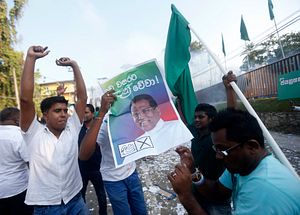Sri Lankan President Mahinda Rajapaksa has been ousted. Just a few months ago such a prospect seemed inconceivable, given Rajapaksa’s popularity among the Sinhalese majority and the enormous control he exercised over state power. But on January 8, the Sri Lankan electorate achieved the impossible by voting Rajapaksa out of office. Unlike other countries that have had to oust dictators through bloody violence or street protests, Sri Lankan voters ended Rajapaksa’s decade-long, increasingly authoritarian rule via the ballot box.
In a bid to preempt waning support, Rajapaksa called elections two years ahead of schedule. The gambit backfired. The joint opposition candidate, Maithripala Sirisena, until recently health minister in the Rajapaksa government, won the presidential election by a margin of 449,072 votes. In an election that produced a record 81.5 percent voter turnout, Sirisena secured 51.28 percent of the votes compared to Rajapaksa’s 47.58 percent.
By any measure, this was a historic election. “This is the first time since the introduction of an all-powerful executive presidency in Sri Lanka that an incumbent lost the election,” observed a Jaffna University professor, who spoke to The Diplomat on condition of anonymity. What is more, Sri Lanka’s “beleaguered minorities,” who account for 30% of the island’s population “can take credit for the electoral defeat of its most powerful president ever.”
Rajapaksa became Sri Lanka’s president first in 2005. In May 2009, his government inflicted a crushing military defeat on the Liberation Tigers of Tamil Eelam (LTTE), ending the 25-year-long civil war. As a wave of Sinhala-Buddhist triumphalism swept the island in the wake of the war victory, Rajapaksa assumed demi-god status among the Sinhalese-Buddhists. His popularity swept him into a second term in 2010 and his Sri Lanka Freedom Party (SLFP)-led United People’s Freedom Alliance’s (UPFA) won a string of elections to parliament, provincial councils and local bodies

































